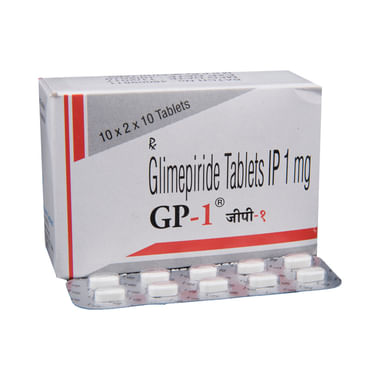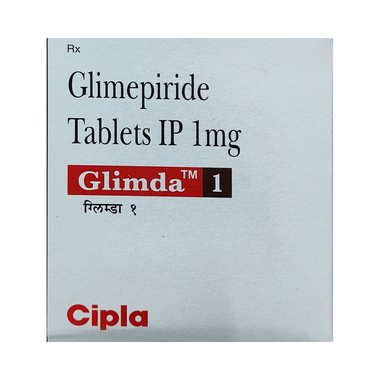GP 1 Tablet


Product introduction
GP 1 Tablet may be used alone or along with other medicines. It should be taken just before or with the first meal of the day. Take it regularly at the same time each day to get the maximum benefit. Your doctor will decide what dose is best for you and this may change from time to time according to your blood sugar levels.
Keep taking GP 1 Tablet, even if you feel well or your blood sugar levels are controlled. If you stop it without consulting your doctor, your blood sugar levels could rise to put you at risk of diabetes complications such as kidney damage, blindness, nerve problems, and loss of limbs. Remember that it is only part of a treatment program that should also include a healthy diet, regular exercise, and weight reduction as advised by your doctor. Your lifestyle plays a big part in controlling diabetes.
The most common side effects of taking GP 1 Tablet include low blood sugar levels (hypoglycemia), nausea, headache, weakness, and dizziness. Make sure you recognize the signs of having low blood sugar levels, such as sweating, dizziness, headache, and shaking, and know how to deal with them. To prevent this, it is important to have regular meals and always carry a fast-acting source of glucose such as sugary food or fruit juice with you. Drinking alcohol can also increase your risk of low blood sugar levels and hence should be avoided. Some people may experience an increase in weight with this medicine.
You should not take GP 1 Tablet if you have type 1 diabetes mellitus, diabetic ketoacidosis (high levels of acid in your blood), or if you have severe kidney or liver disease. Before taking this medicine, tell your doctor if you have ever had heart disease, thyroid disease, or some hormonal conditions, as it may not be suitable. Pregnant or breastfeeding women should also consult their doctor before taking it. Your blood sugar levels should be checked regularly and your doctor may also advise blood tests to monitor your blood cell counts and liver function.
Uses of GP Tablet
Benefits of GP Tablet
In Type 2 diabetes mellitus
Side effects of GP Tablet
Common side effects of GP
- Hypoglycemia (low blood glucose level)
- Headache
- Nausea
- Dizziness
- Weakness
How to use GP Tablet
How GP Tablet works
Safety advice
Monitoring of the breastfed infant's blood glucose is advisable during maternal therapy with GP 1 Tablet
Use of GP 1 Tablet is not recommended in patients with severe kidney disease. These patients can experience very low blood sugar levels which may become normal after a long time.
However, the use of GP 1 Tablet is not recommended in patients with severe liver disease. These patients can experience very low blood sugar levels which may become normal after a long time.
What if you forget to take GP Tablet?
All substitutes
Quick tips
- Take GP 1 Tablet shortly before or with the first main meal of the day (usually breakfast).
- Exercise regularly, eat a healthy diet and take your other diabetes medicines (if prescribed) alongside.
- Monitor your blood sugar level regularly while you are taking GP 1 Tablet.
- GP 1 Tablet can cause hypoglycemia (low blood sugar level) when used with other antidiabetic medicines, alcohol or if you delay or miss a meal.
- Be careful while driving or operating machinery until you know how GP 1 Tablet affects you.
- Always carry some sugary food or fruit juice with you in case you experience hypoglycemic symptoms such as cold sweats, cool pale skin, tremor and anxiety.
- Your doctor may check your liver function regularly. Inform your doctor if you develop symptoms, such as abdominal pain, loss of appetite, or yellowing of the eyes or skin (jaundice).
Fact Box
Interaction with drugs
Patient concerns
User feedback
FAQs
What is the dosage of GP 1 Tablet?
Does GP 1 Tablet make you sleepy?
Is GP 1 Tablet safe for kidneys?
Does GP 1 Tablet cause memory loss?
Who should not take GP 1 Tablet?
How long does it take for GP 1 Tablet to start working?
How long do I need to take GP 1 Tablet? Can I stop the medication?
What can happen if I take more than the recommended dose of GP 1 Tablet?
Can you take GP 1 Tablet on an empty stomach?
Can GP 1 Tablet cause weight gain?
Can GP 1 Tablet cause dizziness?
What should you not eat while taking GP 1 Tablet?
Is GP 1 Tablet safe to use?
Can people with diabetes have proteins?
Are artificial sweeteners good for people with diabetes?
Can diabetes cause kidney failure?
Can diabetes be cured?
Disclaimer:
Tata 1mg's sole intention is to ensure that its consumers get information that is expert-reviewed, accurate and trustworthy. However, the information contained herein should NOT be used as a substitute for the advice of a qualified physician. The information provided here is for informational purposes only. This may not cover everything about particular health conditions, lab tests, medicines, all possible side effects, drug interactions, warnings, alerts, etc. Please consult your doctor and discuss all your queries related to any disease or medicine. We intend to support, not replace, the doctor-patient relationship.References
- Powers AC, D’Alessio D. Endocrine Pancreas and Pharmacotherapy of Diabetes Mellitus and Hypoglycemia. In: Brunton LL, Chabner BA, Knollmann BC, editors. Goodman & Gilman’s: The Pharmacological Basis of Therapeutics. 12th ed. New York, New York: McGraw-Hill Medical; 2011. pp. 1255-1257.
- Nolte MS. Pancreatic hormones and antidiabetic drugs. In: Katzung BG, Masters SB, Trevor AJ, editors. Basic and Clinical Pharmacology. 11th ed. New Delhi, India: Tata McGraw Hill Education Private Limited; 2009. pp. 740.
- Briggs GG, Freeman RK, editors. A Reference Guide to Fetal and Neonatal Risk: Drugs in Pregnancy and Lactation. 10th ed. Philadelphia, PA: Wolters Kluwer Health; 2015. pp. 629-30.
Marketer details
Expires on or after: July, 2026
A licensed vendor partner from your nearest location will deliver GP 1 Tablet. Once the pharmacy accepts your order, the details of the pharmacy will be shared with you. Acceptance of your order is based on the validity of your doctor's ℞ and the availability of this medicine.
In case of any issues, contact us
Email ID: [email protected]Phone Number: 0124-4166666
Address: 5th Floor Tower - B of the Presidency Building, 46/4 Mehrauli Gurgaon Road, Sector 14, Gurugram, Haryana-122001, India
Lab tests offered by us











